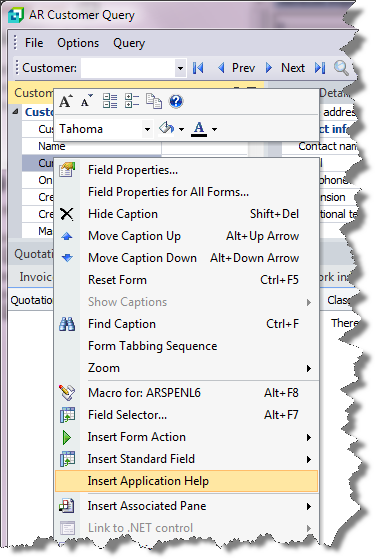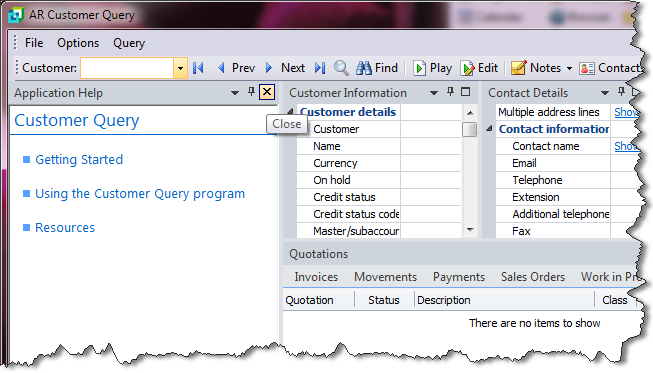You use the Asset Query program to view details of assets held on file.
This program can be run at any time.
The information shown is up to date as at the last time the Asset Depreciation Calculation program was run in update mode.
If you are new to this query, then the following information will help you achieve the best results:
-
If you know the asset code, then you can enter it directly and press the Tab or Enter key to view the information.
If you do not know the asset code, then you can use the browse function to locate the asset.
-
You can personalize this query in a number of ways. These include:
- setting preferences that affect what information is displayed (see Asset Entries Selection).
- configuring property sheets (e.g. the section headed Asset Details). This includes being able to sequence items by dragging them up or down, to show important items first
- configuring the Asset Entries ad Asset Transactions listviews. This includes being able to sequence columns by dragging them left or right, sorting columns and changing column widths
- configuring the layout of the panes on the screen, including hiding or displaying panes
- Asset Query
- Asset Details
- Purchasing Details
- Asset Transactions
- Depreciation Books
- Asset Entries Selection
| Field | Value | Description |
|---|---|---|
| File | ||
| Exit | Select this to exit the program. | |
| Sequence | ||
| Asset | Select this to view assets in asset number sequence. | |
| Description | Select this to view assets in asset description sequence. | |
| Group | Select this to view assets in asset group sequence. | |
| Location | Select this to view assets in asset location sequence. | |
| Branch | Select this to view assets in asset branch sequence. | |
| Asset | You use this field to indicate the code of the asset you want to query. | |
| Find | Select this to use the Generic Find program to locate items according to extensive search criteria. | |
| Play | Select this to view any multimedia object that has been assigned to the asset. | |
| Edit | Select this to use the Multimedia program to maintain multimedia objects for the asset. | |
| Notepad | Select this to use the Notepad Editor program to add rich format text to the asset. |
The following information is included in this pane:
-
Asset information
This corresponds to the information entered against the asset in the Asset Details pane of the Assets program.
The Asset quantity is entered using the Asset Acquisition program.
-
Previous
This indicates the previous asset branch and location which are displayed if you used the Asset Transfer program to transfer the asset to a different location/branch.
-
Original values
This displays the original values entered against the asset using the Asset Acquisition program.
The Start depreciation date is calculated according to the Purchase date entered or the Start depreciation period and Start depreciation year when you are using 13 accounting periods (Company Maintenance).
-
User defined fields
These are entered in the Asset Details pane of the Assets program.
-
Alternate valuation flags
This indicates the alternate valuation depreciation books which exist against the asset. These are selected in the Assets program.
-
Disposal
This indicates the disposal details for the asset (see Asset Disposal).
The information in this pane corresponds to the purchasing details entered against the asset. See Purchasing Details.
This listview displays details of all transactions posted against the asset using the Asset Transactions program.
Only details for the alternate depreciation books you selected to keep for the asset can be displayed (Assets).
| Field | Value | Description |
|---|---|---|
| Book 1 | You use this field to indicate the first depreciation book for which you want to display the details. | |
| Book 2 | You use this field to indicate the first depreciation book for which you want to display the details. | |
| Go | Select this to display the details of the depreciation books you selected. |
The following information is included in this pane for the selected depreciation book:
-
Depreciation details
The information in this pane corresponds to the details entered in the Assets program for the selected depreciation book.
The Reason for revaluation code is displayed if the asset was revalued - see Asset Revaluation.
-
Depreciation values
-
Cost/Cash price
This indicates the current cost value of the asset. This is changed by acquisitions processed (see Asset Acquisition).
-
Current value
This indicates the total cost/cash price less total depreciation to date.
-
-
Tax additional information
Refer to Tax Details.
This listview displays details of entries posted against the asset.
![[Note]](images/note.png)
|
|
|
Only the entries you selected to include are displayed (see Asset Entries Selection). |
|
-
Entry type
This indicates the source of the entry. Entry types include:
- Depreciation - see Asset Depreciation Calculation.
- Depr Adj - see Asset Depreciation Adjustment.
- Catch-up Depr - this is calculated and added per your selection at the Options on addition setup option (Asset Register Setup - General tab)
- Asset Adjustment - e.g. change of EUL - see Asset Depreciation Adjustment and Asset Depreciation Adjustment Recalc.
- Revaluation - see Asset Revaluation.
- Revaluation depreciation - see Asset Revaluation.
- Transfer - see Asset Transfer.
- Inter co transfer
- Addition (initial)- see Asset Acquisition.
- Addition to existing asset - see Asset Acquisition.
- Disposal (final) - see Asset Disposal.
- Disposal (partial) - see Asset Disposal.
- Disposal (Asset count) - indicates that an asset disposal was processed from the Asset Count Confirm program.
- Asset Count Adjustment - indicates that the asset quantity was changed when the Update function of the Asset Count Confirm program was run.
-
Addition (Asset count) - indicates that an asset acquisition was processed from the Asset Count Confirm program.
- Asset Split (this is not available in the current version of the software).
- Change
This listview displays the historical values for the asset for each year and period within each year.
The following information is included:
-
Depreciation value
This indicates the depreciation values for Basis for Depreciation types Year and Life of asset (Asset Register Setup).
-
Depreciation addition
This indicates the depreciation values for Basis of depreciation type Period (Asset Register Setup).
This enables you to indicate options that will determine the level of detail you want to view within the Asset Entries pane for each depreciation book.
| Field | Value | Description |
|---|---|---|
| Refresh | Select this to redisplay the information in the Asset
Entries pane to reflect changes you made to the selections in
this pane. This function is only enabled when you make a change to the asset entries selections. |
|
| Autoload Values | These options enable you to indicate how you want to save the
selections made in this pane. You can choose to set all selections as they were when you last ran the program (i.e. Load Previous Form Values) or save your selections in the pane as your default preferences for all companies, or for the current company only (i.e. Save Form Values as Default or Save Form Values for this Company). If you have saved form values for the company or as the default, then you can remove these settings and restore them to the form's default preference selections. |
|
| Year selection | This enables you to indicate the financial year(s) for which you want to display asset entries for the depreciation books. | |
| Period selection | This enables you to indicate the period(s), within the selected years, for which you want to display asset entries for the depreciation books. | |
| Date selection | This enables you to indicate the dates, within the period(s) and year(s) indicated, for which you want to display asset entries for the depreciation books. | |
| Include | This option enables you to select the type of asset
entries you want to include in the Asset Entries listview when
querying a depreciation book. The following entry types can be selected/deselected:
|
Inserting Application Help
You would typically follow this procedure to display help for the current program in a customized pane that can be pinned to the program window.
Information includes step-by-step instructions for the various functions available within the program, including a brief overview of what the program does, what setup options are required and how to personalize the program.
-
Open the program for which you want to insert application help into a customized pane.
This functionality is only available for a program that has panes.
-
Right-click any form field.
You can also click the triangle menu icon that appears in the title area of a pane.
-
Select Insert Application Help from the context-sensitive menu.
The application help appears in a pane within your program. You can reposition the pane using the docking stickers or pin it to the program window.
Removing the Application Help pane
If you no longer want to display application help in a pane for your current program, you can simply remove it.
-
Select the Close icon in the right-hand corner of the application help pane.
-
Confirm that you want to delete the pane.

